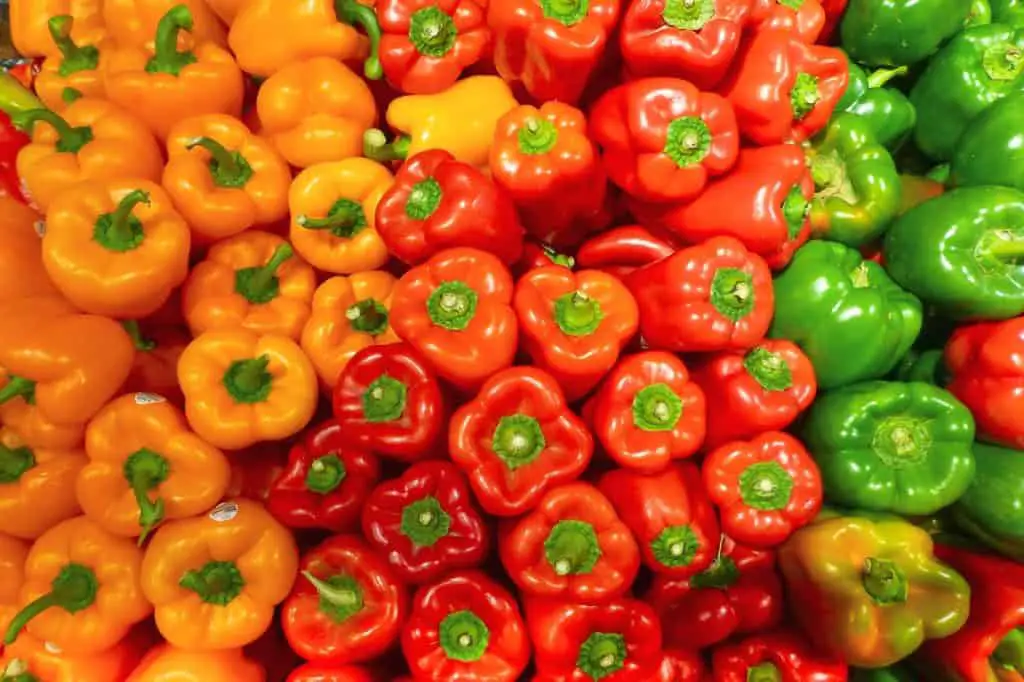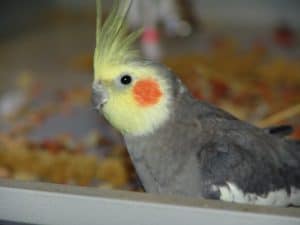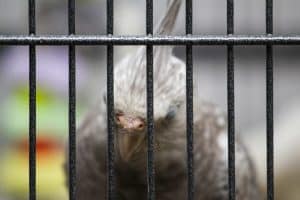Can cockatiels eat bell peppers? This question has been a topic of interest for many cockatiel owners who wish to provide their feathered companions with a diverse and healthy diet. Bell peppers, known for their vibrant colors and rich nutritional profile, serve as an excellent addition to human meals, but is it safe for these charming birds?
In this article, we will explore the health benefits, safety concerns, and ways to incorporate bell peppers into your cockatiel’s menu, ensuring an enriching and flavorful experience for them.
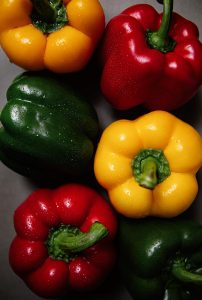
Can cockatiels eat bell peppers?
Yes, cockatiels can safely eat bell peppers even green bell peppers, yellow bell peppers and orange bell peppers. In fact, they are a great source of many healthy nutrients and should be included as part of your cockatiel’s diet. However, you need to be careful not to feed them too much fresh produce overall. Feeding bell peppers should only make up a small portion of their diet.
Can I give my cockatiel bell peppers are safe for birds to eat is a valid question. The truth is, they can have them, but not in large quantities. Birds need a diet that’s balanced and includes mostly seeds and nuts.
Are bell peppers good for cockatiels?
Yes! Cockatiels will enjoy the flavor and crunch of bell peppers in a variety of ways. They’ll be especially interested in green peppers, red bell peppers or any type of bell peppers, and it’s always a good idea to have a lot of things they like. Bell peppers are also high in fiber, which is beneficial to your cockatiel’s health.
Fiber is essential for your cockatiel’s overall digestive health, and fresh vegetables are a great way to get it. They are also rich in vitamin C, vitamin K and other nutrients.
These vitamins also act as antioxidants, which prevents free radicals from forming in your cockatiel’s cells.
Free radicals have the potential to cause damage to cells over time. Bell peppers contain beta carotene, which is converted into vitamin A in your cockatiel’s body. They are also a great source of potassium and folate.
Bell peppers are indeed packed with healthy nutrients, but this is exactly why you need to be careful of overindulging. Too much of anything– even something good for you– can have negative consequences. Let’s explore some moderation ideas concerning bell peppers specifically.
Are bell peppers bad for cockatiels?
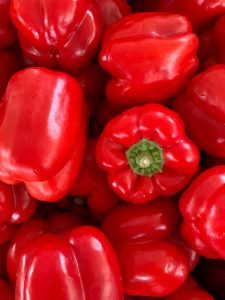
Cockatiels can eat peppers without harm, although there are some precautions to take. They aren’t poisonous, for example. That said, you still need to be extremely cautious about how much your cockatiel eats. When it comes too much of anything, problems soon arise.
Any fresh fruit or vegetable should only be a small part of your cockatiel’s diet, with the rest being seeds and nuts. Bell peppers are nutrient-rich, which means that overeating them can cause problems.
Feed them bell peppers once or twice a week in modest amounts. Replace it with other fresh fruits and vegetables for the rest of the week. This will give your dogs the most nutrients while also preventing them from becoming bored.
Can cockatiels eat raw bell peppers?
Yes, and raw is generally the way to go. The finest imitation of what your cockatiel would eat in the wild will be provided by raw bell peppers. Furthermore, they will prefer the taste and texture of raw bell peppers, and they will contain all of the nutrients.
There will be no loss to cooking. However, before feeding them, you should chop them up somewhat. Otherwise, they’ll have a hard time.
Can cockatiels eat bell pepper seeds?
Cockatiels can safely eat bell peppers, including the seeds. Some bird owners prefer to remove the seeds as a precaution, but it is not necessary. Bell pepper seeds are non-toxic and pose no harm to your feathered friend. It is essential, however, to thoroughly wash the bell peppers before feeding them to your cockatiel to remove any pesticides or contaminants.
Can cockatiels eat sweet peppers?
Yes, cockatiels can eat sweet peppers. Sweet peppers, often referred to as bell peppers, are not only a safe option but also provide various health benefits for your bird. These peppers are rich in vitamins A, C, and E and antioxidants, which support the immune system and promote healthy feathers and skin.
When introducing sweet peppers to your cockatiel’s diet, start with small amounts and watch for their reaction. Each bird has individual preferences, and it may take some time for your cockatiel to develop a taste for this new treat.
- Parrot Essential Toy: The bird parrot toy provides essential physical activity to keep your feather friends stable and happy, and improve your health. There are several multi-colored blocks in this single toy to entice your bird. These blocks are arranged in multiple layers to climb and explore.Birds also love to untie cotton rope knots, which satiates their natural urge to chew.
- Safe To Chew: Our wood parrot toys are made of pure natual wood & cotton rope, all of them are dyed by edible pigments, and completed with pure handmade which are more bite resistand and durable.
- Perfect Size: The size is 13.78" X 5.12". perfect size for small and medium birds. It is suggested for african greys, budgies, parakeets, cockatiels, conures, lovebirds and other similar sized birds. Provide your bird an ideal elevated place to chew and climb.
- Beak Trimmed: Parrot's beak keeps growing to keep sharp. if her beak is long can affect the ability of the parrot to eat and damage her health. Our parrot chew toys contain colored wooden blocks and other accessories in various shapes to attract your parrot to chew, help your feather friends to preen and condition their beak.
- Best Gifts For Your Parrot: It is designed in bright color, which can easily attract parrots attention in short time and they will play with these toys for long time daily, keep your parrots busy, less destructive and have more fun hours.
Can cockatiels eat hot peppers?
Surprisingly, cockatiels can eat hot peppers without experiencing discomfort due to their insensitivity towards capsaicin, the compound responsible for the spicy sensation in humans. Birds lack the receptors necessary to detect this spiciness, allowing them to enjoy hot peppers without any adverse effects.
However, it is essential to approach this with caution. Not all cockatiels may like or enjoy hot peppers, and offering the pepper in moderation is vital. When introducing hot peppers to your bird’s diet, start with small amounts and observe its reaction.
It is worth noting that feeding hot peppers is not crucial, and bell peppers or sweet peppers can provide similar nutritional benefits without the strong flavor. If your bird does not show interest in hot peppers, there is no need to insist on incorporating them into their diet.
Can cockatiels eat cooked bell peppers?
There is no reason to cook bell pepper in this manner for them, even if it’s a little amount. They will prefer it raw, and they will get all the advantages that way.
If you do have a tiny amount of leftover cooked bell pepper, it’s fine to share it. However, be careful what you cooked the peppers in because too much oil or any other cooking substances might make them dangerous for your cockatiel. Finally, raw is the greatest option—trying to model your cockatiel’s natural, wild diet as closely as possible is best.
The answer to Can Cockatiels Eat Bell Peppers is?
So, occasionally adding a little raw bell pepper to your cockatiel’s diet can be beneficial. They will enjoy the taste, crunch, and other nutritional benefits that they are unaware of. In conclusion, you must always exercise caution when it comes to moderation.
Fresh, complex carbohydrates like bell peppers should be enjoyed only as a special treat rather than a large part of one’s meal. Bell peppers are fantastic if you keep this in mind.
For more valuable insights and tips on cockatiel care, don’t miss out on our other comprehensive articles. Discover how to identify and address stress in your feathered friend by reading How to Recognize and Treat Cockatiel Anxiety. Enhance your cockatiel’s daily routine with engaging ideas from Incorporating Foraging Activities into Your Cockatiel’s Routine. Learn about the best plants to include in your cockatiel’s cage in The Best Plants for Cockatiel Cages. If you’re curious about dietary options, check out Can Cockatiels Eat Bean Sprouts? for an in-depth look. Lastly, get advice on safe and suitable cage lining materials by visiting Can Cockatiels Eat Newspaper?. Each of these resources is packed with valuable knowledge to help ensure your cockatiel’s health and happiness.
- Can a Cockatiel be Constipated?
- Can a Cockatiel be kept outside?
- Can a Cockatiel Be Left Alone for a Weekend?
- Can a Cockatiel Be Potty Trained?
- Can a Cockatiel Eat Too Much Millet?
- Can a Cockatiel Fly Without Tail Feathers?
- Can a Cockatoo Live With a Cockatiel?
- Can an Old Cockatiel be Tamed?
- Can Birds Catch Human Colds?
- Can Birds Walk Backwards?
- Can Cockatiels Change Color?
- Can Cockatiels Drink Coconut Water?
- Can Cockatiels Drink Coffee?
- Can Cockatiels Drink Milk?
- Can Cockatiels Drink Tea?
- Can Cockatiels Eat Alfalfa Sprouts?
- Can Cockatiels Eat Almonds?
- Can Cockatiels Eat Aloe Vera?
- Can Cockatiels Eat Apples?
- Can Cockatiels Eat Apricots?
- Can Cockatiels Eat Arugula?
- Can Cockatiels Eat Asparagus?
- Can Cockatiels Eat Avocado?
- Can Cockatiels Eat Bacon?
- Can Cockatiels Eat Banana?
- Can Cockatiels Eat Basil?
- Can Cockatiels Eat Bean Sprouts?
- Can Cockatiels Eat Beetroot?
- Can Cockatiels Eat Bell Peppers?
- Can Cockatiels Eat Blackberries?
- Can Cockatiels Eat Blueberries?
- Can Cockatiels Eat Bread?
- Can Cockatiels Eat Broccoli?
- Can Cockatiels Eat Brussel Sprouts?
- Can Cockatiels Eat Budgie Food?
- Can Cockatiels Eat Cabbage?
- Can Cockatiels Eat Cantaloupe?
- Can Cockatiels Eat Carrots?
- Can Cockatiels Eat Cashews?
- Can Cockatiels Eat Cauliflower?
- Can Cockatiels Eat Celery?
- Can Cockatiels Eat Cheerios?
- Can Cockatiels Eat Cheese?
- Can Cockatiels Eat Cherries?
- Can Cockatiels Eat Chia Seeds?
- Can Cockatiels Eat Chicken?
- Can Cockatiels Eat Chickpeas?
- Can Cockatiels Eat Chocolate?
- Can Cockatiels Eat Cilantro?
- Can Cockatiels Eat Cinnamon?
- Can Cockatiels Eat Clover?
- Can Cockatiels Eat Coconut?
- Can Cockatiels Eat Corn?
- Can Cockatiels Eat Crackers?
- Can Cockatiels Eat Cucumbers?
- Can Cockatiels Eat Dandelion Leaves?
- Can Cockatiels Eat Dates?
- Can Cockatiels Eat Dill?
- Can Cockatiels Eat Dog Food?
- Can Cockatiels Eat Dragon Fruit?
- Can Cockatiels Eat Dried Cranberries?
- Can Cockatiels Eat Eggplant?
- Can Cockatiels Eat Eggs?
- Can Cockatiels Eat Eucalyptus Leaves?
- Can Cockatiels Eat Fennel?
- Can Cockatiels Eat Figs?
- Can Cockatiels Eat Fish?
- Can Cockatiels Eat Flax Seeds?
- Can Cockatiels Eat Flowers?
- Can Cockatiels Eat French Fries?
- Can Cockatiels Eat Garlic?
- Can Cockatiels Eat Ginger?
- Can Cockatiels Eat Grapefruit?
- Can Cockatiels Eat Grapes?
- Can Cockatiels Eat Grass?
- Can Cockatiels Eat Green Beans?
- Can Cockatiels Eat Guava?
- Can Cockatiels Eat Hazelnuts?
- Can Cockatiels Eat Honey?
- Can Cockatiels Eat Ice Cream?
- Can Cockatiels Eat Jackfruit?
- Can Cockatiels Eat Jalapenos?
- Can Cockatiels Eat Kale?
- Can Cockatiels Eat Kidney Beans?
- Can Cockatiels Eat Kiwi?
- Can Cockatiels Eat Lavender?
- Can Cockatiels Eat Leeks?
- Can Cockatiels Eat Lemon?
- Can Cockatiels Eat Lemongrass?
- Can Cockatiels Eat Lentils?
- Can Cockatiels Eat Lettuce?
- Can Cockatiels Eat Lychees?
- Can Cockatiels Eat Macadamia Nuts?
- Can Cockatiels Eat Mandarins?
- Can Cockatiels Eat Mango?
- Can Cockatiels Eat Mealworms?
- Can Cockatiels Eat Meat?
- Can Cockatiels Eat Mint?
- Can Cockatiels Eat Mushrooms?
- Can Cockatiels Eat Newspaper?
- Can Cockatiels Eat Noodles?
- Can Cockatiels Eat Nuts?
- Can Cockatiels Eat Oats?
- Can Cockatiels Eat Olives?
- Can Cockatiels Eat Onions?
- Can Cockatiels Eat Oranges?
- Can Cockatiels Eat Papaya?
- Can Cockatiels Eat Parakeet Food?
- Can Cockatiels Eat Parsley?
- Can Cockatiels Eat Pasta?
- Can Cockatiels Eat Peanut Butter?
- Can Cockatiels Eat Peanuts?
- Can Cockatiels Eat Pears?
- Can Cockatiels Eat Peas?
- Can Cockatiels Eat Pecans?
- Can Cockatiels Eat Pineapple?
- Can Cockatiels Eat Pistachios?
- Can Cockatiels Eat Pomegranate?
- Can Cockatiels Eat Popcorn?
- Can Cockatiels Eat Potato Chips?
- Can Cockatiels Eat Potatoes?
- Can Cockatiels Eat Pretzels?
- Can Cockatiels Eat Pumpkin Seeds?
- Can Cockatiels Eat Pumpkin?
- Can Cockatiels Eat Quinoa?
- Can Cockatiels Eat Radishes?
- Can Cockatiels Eat Raisins?
- Can Cockatiels Eat Raspberries?
- Can Cockatiels Eat Rice Cakes?
- Can Cockatiels Eat Rice?
- Can Cockatiels Eat Salmon?
- Can Cockatiels Eat Scrambled Eggs?
- Can Cockatiels Eat Sesame Seeds?
- Can Cockatiels Eat Snow Peas?
- Can Cockatiels Eat Spinach?
- Can Cockatiels Eat Strawberries?
- Can Cockatiels Eat Sunflower Seeds?
- Can Cockatiels Eat Sweet Potato?
- Can Cockatiels Eat Thistles?
- Can Cockatiels Eat Tomatoes?
- Can Cockatiels Eat Tortilla Chips?
- Can Cockatiels Eat Tortillas?
- Can Cockatiels Eat Tuna?
- Can Cockatiels Eat Turkey?
- Can Cockatiels Eat Walnuts?
- Can Cockatiels Eat Watermelon?
- Can Cockatiels Eat Weetbix?
- Can Cockatiels Eat Wild Bird Seed?
- Can Cockatiels Eat Yogurt?
- Can Cockatiels Eat Zucchini?
- Can Cockatiels Get Fleas
- Can Cockatiels Get Hiccups
- Can Cockatiels Sleep With Noise
- Can Cockatiels Survive In Cold Weather
- Can Cockatiels Swim
- Can Cockatiels Talk How To Get Your Cockatiels Talking
- Can Cockatiels Talk
- Can Cockatiels Wear A Harness
- Can Cockatiels Wear Diapers
- Can You Be Allergic To Cockatiels
